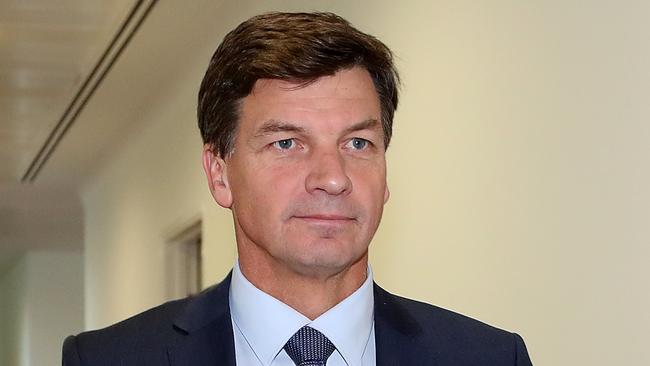Minister’s ‘fossil fuel blueprint’ to lower power prices
Scott Morrison is under pressure to put fossil fuels at the heart of the government’s energy policy.

Scott Morrison is under pressure to put fossil fuels at the heart of the government’s energy policy, after Resources Minister Matt Canavan called for “a new era of energy and resources abundance” and Liberal elder Nick Minchin urged power prices and system reliability be prioritised ahead of the Paris emissions commitment.
New Energy Minister Angus Taylor, dubbed by the Prime Minister as “the minister for getting energy prices down”, yesterday talked to stakeholders who want an urgent energy policy blueprint to end investor uncertainty.
A week after the collapse of the national energy guarantee, pro-coal Coalition backbenchers yesterday called for action on implementing measures, promised by Malcolm Turnbull, to encourage new baseload power.
Labor also seized on Mr Taylor’s appointment as Energy Minister, branding the Rhodes scholar and former McKinsey and Co partner as “the most anti-renewable, climate change denying minister Australia has ever had”.
New Treasurer Josh Frydenberg, the architect of the NEG, yesterday declared renewables would play an important role in the future energy mix, with the government remaining “agnostic” on energy technologies.
Senator Canavan said coal and gas should form the centrepiece of the government’s new energy blueprint.
“We need a new era of energy and resources abundance,” the Resources Minister said. “God has given us an abundance of energy below the ground but we need to convert that to an abundance above the ground to bring on more energy supply and lower prices.”
Backbenchers, including Nationals Keith Pitt and George Christensen, want the Coalition to support construction of coal-fired power plants and abandon the Paris agreement, a key plank of Mr Turnbull’s energy policy.
Mr Minchin, who resigned from cabinet in 2009 over Mr Turnbull’s climate change policy, said he believed pulling out of the Paris agreement now would cause too much political pain.
He said in the interests of Coalition unity, the government should instead make it clear the target was only an aspiration.
“I think the government would be wise to consider keeping an aspirational target that is consistent with reasonably priced and reliable energy,” the former senator told The Australian.
Mr Minchin praised the Prime Minister’s decision to split the energy and environment portfolios. “Our energy problem is that the focus on renewable energy has meant the explosion of energy from windmills and solar panels, which are inherently intermittent and unreliable,” Mr Minchin said. “So the critical thing for the nation is to maximise reliability and lower pricing.”
Mr Christensen yesterday calling for a new fund to support the development of high-efficiency, low-emissions coal-fired power stations. “We need a substantial new fund to get HELE plants over the line, because of the substantial risk that investors face when they are investing in coal-fired power,” he said.
Mr Pitt also called for direct support for new baseload power.
“In terms of delivery, we need to see new power stations, whether that's HELE coal or the 600 megawatt Tully Millstream hydro power project,” he said.
While the government tries to shift the focus to power prices and reliability, Labor wants to fight the election on renewable energy and climate change.
Opposition energy spokesman Mark Butler said Mr Taylor was an energy “ideologue” and anti-renewables campaigner who led the campaign to kill off the NEG.
“His appointment signals the complete triumph of hard-right ideology on energy policy, which is sure to guarantee higher power prices, continued investment uncertainty and rising pollution,” Mr Butler said.
Australian Energy Council chief executive Sarah McNamara urged a new energy framework that also considered carbon emissions. “A lack of clarity about future emissions policy would continue the kind of investment uncertainty we’ve had for an extended period,” she said.
The Energy Users Association of Australia said the government’s policy must deal with the reality of high levels of renewables in the national market.



